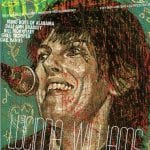Dale Ann Bradley – Starting to find what she’s looking for
The first thing that strikes you is her voice. You could listen for hours to its clear, steady tone, her gentle, distinctive phrasing, the way she delicately anticipates or lingers behind the song’s pulse, the slight whisper of a “sh” in each “s”, and the occasional turns and curls that embellish particular words. Or you could think about the way she’s covered Gordon Lightfoot, Jim Croce, U2 and Stealer’s Wheel. Chances are you’d never guess that she grew up in the hills of southeastern Kentucky and has, save for a three-year stretch in Jacksonville, Florida, while married to a Navy man, lived all her life in small towns in the Bluegrass State.
Dale Ann Bradley has made a career out of quietly yet persistently sidestepping convention, and nowhere is that more evident than on her new album, Cumberland River Dreams.
After spending most of the 1990s with various permutations of the New Coon Creek Girls and as a solo artist on the Pinecastle label, she signed late last year with Tim Austin’s Doobie Shea Records. Straight into the studio she went with her band and a clutch of high-powered guests, emerging this spring with an album that stands head and shoulders above the excellent Old Southern Porches (1999) and East Kentucky Morning (1997).
Bradley is no newcomer to the art of recording, but it’s not hard to hear a fresh start in Cumberland River Dreams. It’s an album that not only crystallizes a lifetime’s worth of experience, but fairly bursts with a sense of liberation, the kind that takes a musician to a whole new level of both art and career.
Bradley could use that kind of boost right about now. Her career has been percolating along for the past decade or so, but it’s been tough; she’s suffered some for being eclectic in a bluegrass scene that’s trended traditional, and while she’s had some success at Americana radio, she hasn’t really broken out of bluegrass either.
Critics such as the redoubtable Robert K. Oermann, who wrote the liner notes to Cumberland River Dreams, have raved about her for years, but while that makes for great ad copy and a hefty press kit, good reviews don’t pay the rent. Though she’s not one to complain about it, Bradley has struggled to survive as an artist making her music her way.
“I grew up in Pineville, down in the southeastern most corner; it’s in the Cumberland Gap area on the Kentucky side,” Bradley recalls, and though her singing voice mutes it considerably, that Kentucky twang still shapes her speech. “Of course, there wasn’t a whole lot to do there. Daddy mined coal, but he was — still is — a Primitive Baptist minister, too, so music was something I kind of had to ease him into.
“For a long time I thought Dolly Parton and Porter Wagoner were the only entertainers in the world; I didn’t know there was any others. My great-uncle from Detroit brought me a little portable 8-track player — that was the first thing I had to play anything on there — and then Porter and Dolly tapes, and I could hear them on Knoxville radio, too. After that, he’d bring something else down every summer, so I eventually found out there was somebody else in the world.”
Once she made that discovery, Bradley’s taste ran unrestrained for a while. “I liked some of the folk music that came out of the ’60s, like Peter, Paul & Mary, and I loved John Denver and Jim Croce,” she told an interviewer in 1998, “and then I turned into an avid Bee Gees fan. [Emmylou Harris’] Roses In The Snow, that was a big influence around the same time.”
Still, she says, “I was mostly touched by bluegrass. Anything that I liked lyrically or melodically, I automatically heard a banjo in it — all the time.” With that kind of bent, it’s not surprising that when she finally talked her father into allowing her a guitar, she found herself in a bluegrass band in short order.
“I was real influenced by my band director. He was also the recreational director at Pine Mountain State Park, so he invited me to come up; he taught me guitar and I would sing trios with him and his wife. Then another guy who lived in the community really took an interest and wanted to help me. We got this band thing together, and he was the one that…there would be songs, I’d say ‘I love that song,’ and he’d say, ‘Well, you can do that bluegrass.’ He encouraged that kind of thinking, so I really owe him a lot,” Bradley says, though one suspects she would have done it anyhow.
Back Porch Bluegrass worked the area around Pineville for a few years before Bradley got married and, as she says, took her Jacksonville sabbatical. “I’d never been anywhere else, so I certainly wasn’t ready for a cultural change like that, and I didn’t play any music while I was there,” she recalls. Yet before she left Pineville, she had an encounter that would, upon her return, open up the way to make a career out of exactly what she abandoned during the years in Florida.
“That little local band I was in ended up in the finals of a contest,” she says, “and the winner got to open for Ricky Skaggs, Hank Williams Jr. and Ronnie Milsap. We had just submitted a tape through an ad in the newspaper, and lo and behold, we went up to this place up in Lexington, and there were the New Coon Creek Girls. I thought, wow, I want to do that, that’s exactly what I want to do. But then I got married…”




